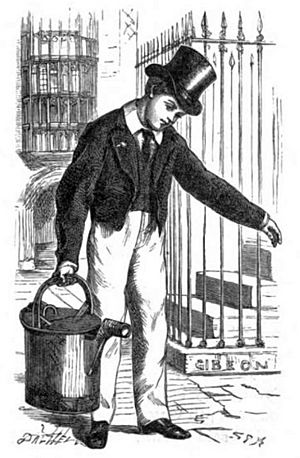Fagging facts for kids

Fagging was a traditional practice in British public schools and also at many other boarding schools, whereby younger pupils were required to act as personal servants to the eldest boys. Although probably originating earlier, the first accounts of fagging appeared in the late 17th century. Although lessening in severity over the centuries, the practice continued in some institutions until the end of the 20th century.
History
Fagging originated as a structure for maintaining order in boarding schools, when schoolmasters' authority was practically limited to the classroom. Thomas Arnold, headmaster of Rugby from 1828 to 1841, defined fagging as the power given by the authorities of the school to the Sixth Form, to be exercised by them over younger boys. Fagging was a fully established system at St Paul's, Eton, and Winchester in the sixteenth century.
Fagging carried with it well-defined rights and duties on both sides. The senior, sometimes called the fag-master, was the protector of his fags and responsible for their happiness and good conduct. In case of any problem outside the classroom, such as bullying or injustice, a junior boy's recourse was to him, not to a form master or housemaster, and, except in the gravest cases, all incidents were dealt with by the fag-master on his own responsibility.
The duties undertaken by fags, the time taken, and their general treatment varied widely. Each school had its own traditions and expectations. Until around 1900, a fag's duties would include such humble tasks as blacking boots, brushing clothes, and cooking breakfasts, and there was no limit as to hours the fag would be expected to work. Later, fagging was restricted to such tasks as running errands and bringing tea to the fag-master's study.
During the late 20th century, fagging became unfashionable in British public schools, as attitudes to boarding education and child development changed. Despite the reluctance of senior boys who had served their time and expected to enjoy the benefits of the system, between the 1960s and 1980s first the duties became less onerous and then the system was abolished at most major public schools. The practice is believed to have become obsolete in Britain.
There is a history of fagging in schools in former British colonies (see India, South Africa) where fagging continues in a limited form at some schools.

